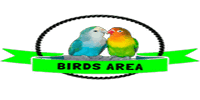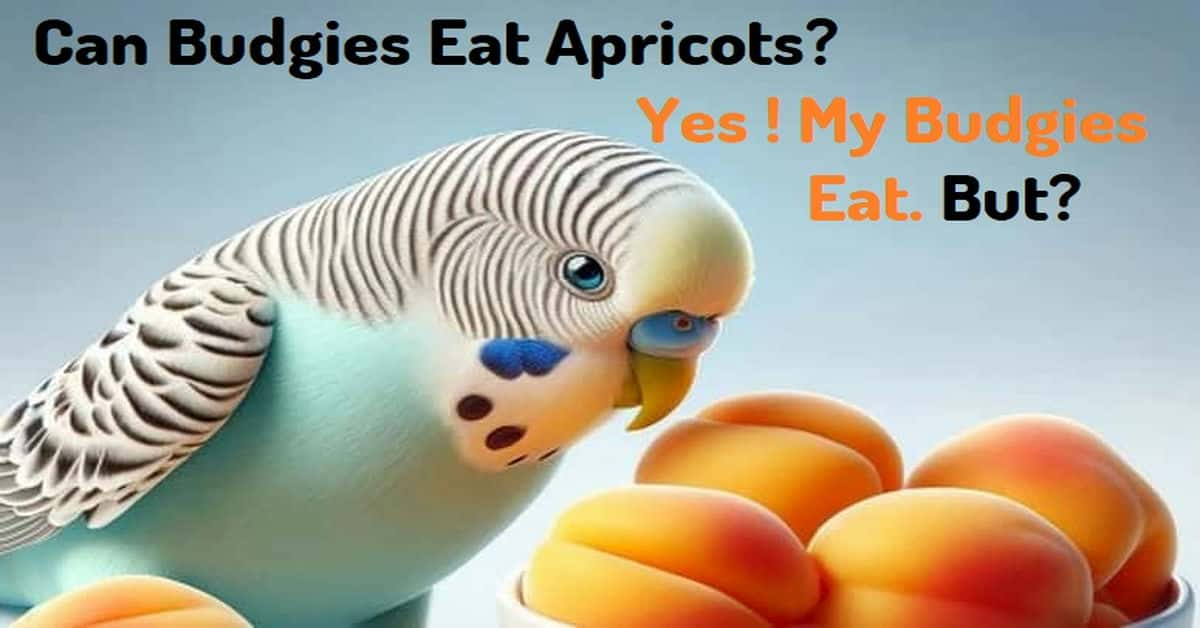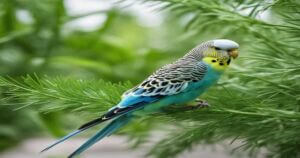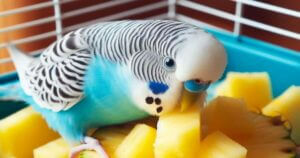Can Budgies Eat Apricots? What to Know
Hey there, budgie fans, So, you’ve got a cute little parakeet at home and wondering about snacks, right? Specifically, apricots. Yummy for us, but can Budgies eat Apricots?
Good news, Budgies can indeed enjoy apricots. But hold on, not too much. They’re a bit sugary. So, think of them as a special treat now and then. Just remember, the pit of an apricot is a no-go. It’s not safe for our bird buddies.
Now, let’s dive into what’s good and not so good about apricots for your budgie. Ready to learn more? Let’s get started.
Can Budgies Eat Apricots?
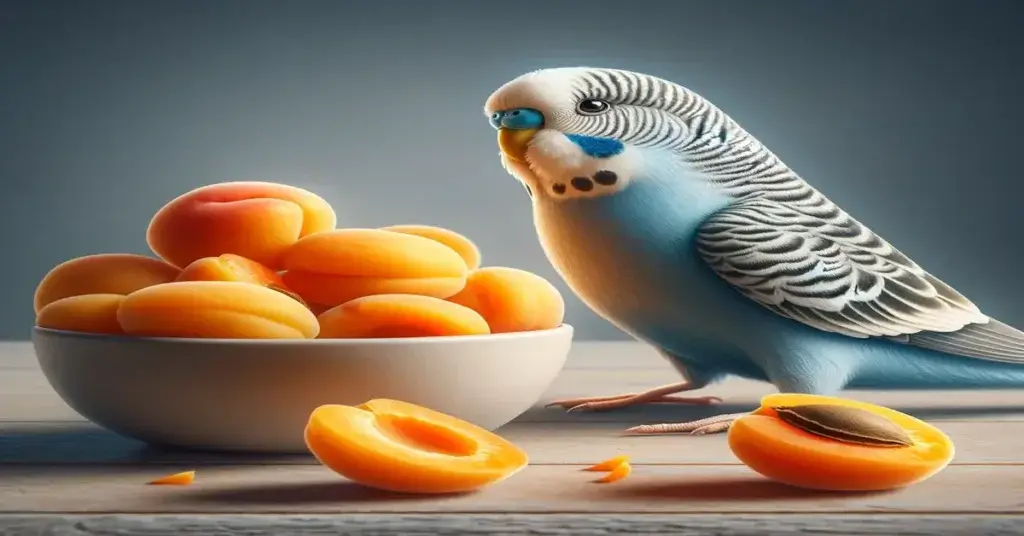
Yes, budgies can eat apricots. Apricots are a sweet treat that can add some variety to your budgie’s diet. Just remember a couple of important things:
- Moderation: Apricots have sugar, so they should only be a small part of your budgie’s diet.
- Remove the Pit: The pit of apricot can be toxic to budgies because it contains cyanide, so always remove it before offering the fruit to your bird.
As long as you keep these points in mind, your budgie can enjoy the occasional apricot as part of a balanced diet.
Are Apricots Good for Budgies?

Yes, apricots can be good for budgies when given as a part of a balanced diet. They provide vitamins and minerals that can be beneficial for a budgie’s health.
Health Benefits Of Apricots For Budgies
Budgies can enjoy apricots as a tasty and nutritious addition to their diet. These fruits are not only delicious but also offer various health benefits for your pet bird.
Let’s explore the reasons why apricots can be a great treat for budgies.
Rich In Vitamins And Minerals
Apricots are rich in essential vitamins and minerals that can support the overall well-being of budgies. They contain vitamins A, C, and E, which are important for maintaining healthy feathers, skin, and a strong immune system.
Additionally, apricots provide potassium, fiber, and antioxidants that contribute to budgies’ digestive health and overall vitality.
Good Source Of Antioxidants
Antioxidants found in apricots can help protect budgies from oxidative stress and promote their overall health and longevity. These natural compounds play a crucial role in combating free radicals and reducing the risk of certain diseases in budgies.
Including apricots in their diet can contribute to their optimal health and vitality in the long run.
Potential Risks Of Feeding Apricots To Budgies

When you’re dishing out snacks to your feathery buddy, knowing what’s safe is super important. Apricots? Sure, they’re yummy and seem healthy. But, there’s stuff to watch out for.
- Apricots and Sugar: Apricots are pretty sweet. And our budgie friends? They’re tiny. Too much sugar isn’t good for them. It can lead to weight issues and other health troubles.
- The Trouble with Pits: Those apricot pits can be tricky. They’re just the right size for a budgie to choke on. Always take the pit out before letting your budgie have a nibble.
How To Feed Apricots To Budgie | The Right Way
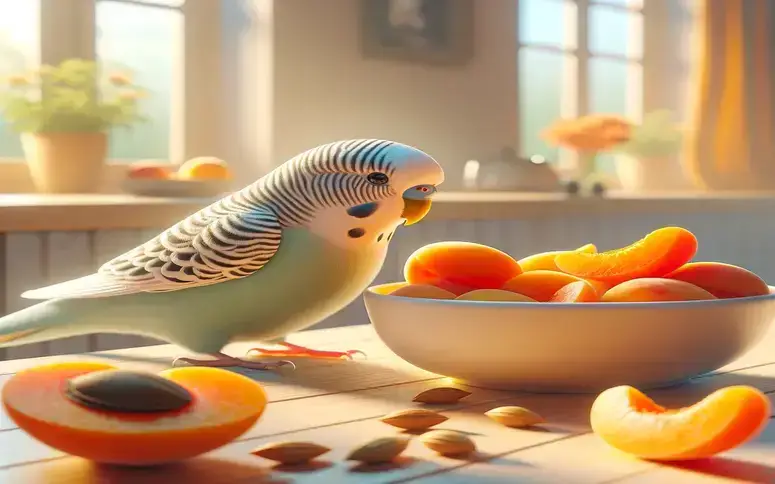
Budgies are curious little ones. They love trying new tastes. You might be thinking, “Can I give my budgie apricots?” Good news – you can. But let’s do it safely.
- Wash and Chop: Start by giving those apricots a good wash. Get rid of any dirt or chemicals. Then, chop them into small pieces. Remember, no pits.
- One Step at a Time: Introduce apricots slowly. Give your budgie a tiny bit to start. Watch how they take to it. If all seems well, you can slowly give a little more.
- Keep an Eye Out: Watch your budgie after they try apricots. Look for any weird reactions like itching, swelling, or tummy troubles. If something seems off, stop the apricot treats and maybe chat with a vet.
Feeding your budgie apricots can be a fun treat for you both. Just make sure you prepare them safely, start slow, and always watch how your budgie is doing. Enjoy snack time with your colorful little friend.
Is Dried Apricot Good For Birds?
Dried apricots can be given to birds like budgies, but it’s important to offer them in moderation. While dried apricots still contain beneficial nutrients like vitamins and minerals, they are also higher in sugar compared to fresh apricots because the drying process concentrates the natural sugars.
Here are some things to consider if you’re thinking about offering dried apricots to your bird:
- Sugar Content: Dried fruits are higher in sugar, which can lead to obesity and other health issues if consumed in large quantities.
- Sulfur Dioxide: Some dried apricots are treated with sulfur dioxide to preserve their color and extend their shelf life. This chemical can be harmful to birds, so it’s best to choose dried apricots that are free from sulfur dioxide and other preservatives.
- Hydration: Dried fruits lack the water content of fresh fruits, so ensure your bird has access to plenty of fresh water.
- Serving Size: Offer dried apricots as an occasional treat, not a regular part of the diet. When you do offer them, make sure they’re cut into small, manageable pieces to prevent choking.
As with any treat, it’s crucial to balance it with a diet that’s primarily composed of high-quality bird pellets, seeds, and a variety of fresh fruits and vegetables. Always introduce new foods gradually and monitor your bird for any signs of adverse reaction.
Alternate Fruits For Budgies
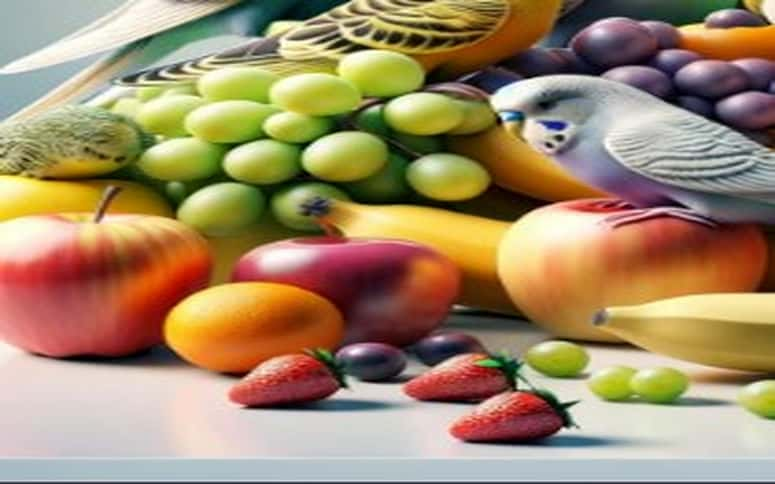
Budgies love to have a variety of fruits in their diet, and providing them with alternate fruits helps to keep their taste buds excited.
While apricots may not be suitable for budgies due to their high sugar content, there are several other safe fruit options that you can offer to your feathered friends.
Here are some fruits that are considered safe for budgies:
| Fruit | Benefits | Preparation Notes |
|---|---|---|
| Apples | Rich in vitamins and minerals | Remove seeds and core |
| Blueberries | Packed with antioxidants | Small and manageable size |
| Grapes | Opt for seedless varieties | Cut into smaller pieces to avoid choking |
| Strawberries | Rich in antioxidants | Fresh and tasty treat |
| Pears | Easy to nibble when sliced | Slice into small pieces |
| Mangoes | Tropical and safe for budgies | Remove the pit |
Can I Feed My Budgie Fruit Everyday?

Sure, feeding daily your budgie fruit is a fab idea, but keeping it balanced is key. Think of fruit as a tasty part of their meals, not the whole thing. Here’s how you can make fruit a healthy, everyday treat:
- Balance is Best: Mix it up with quality pellets (like fortified budgie blends), nutritious seeds (like millet or canary seeds), and fresh veggies (like spinach or carrots). This combo ensures your budgie gets all the nutrients they need.
- Just a Bit: Keep fruit to about 20-25% of your budgie’s daily munch. Too much of the sweet stuff isn’t the way to go.
- Change It Up: Keep your budgie excited about mealtime. Offer different fruits to give your budgie a variety of flavors and nutrients. Today an apple slice, tomorrow a bit of pear.
- Prep Properly: Wash fruits well, get rid of seeds or pits (they can be a no-no for budgies), and chop them into easy-to-eat pieces.
Watch your budgie enjoy their fruit and keep an eye on their health. If you spot anything odd, a vet’s advice is priceless. Each budgie is unique, so what’s yummy for one might not be for another.
What Are Fruits To Avoid Feeding Budgies?

While it’s important to provide your budgie with a variety of fruits, certain fruits should be avoided, as they can be harmful to their health.
Here are some fruits that are unsafe for budgies:
- Avocado: Avocado contains a substance called persin, which is toxic to budgies and can lead to health issues.
- Cherries: The pits in cherries can pose a choking hazard, so it’s best to avoid feeding them to your budgie.
- Citrus fruits: Citrus fruits like oranges and lemons may cause digestive upset in budgies. It’s safer to skip these.
- Grapefruit: Similar to other citrus fruits, grapefruit can also cause digestive issues in budgies, so it’s best to avoid it.
- Pineapple: Pineapple contains enzymes that can irritate the budgie’s digestive system, so it’s better to choose other fruits.
Read in detail about Can budgie eat pineapple.
Remember, while alternate fruits can be a great addition to your budgie’s diet, it’s important to introduce new fruits gradually and in moderation.
Monitor your budgie for any signs of allergies or digestive upset, and consult a veterinarian if you have any concerns.
Frequently Asked Questions For Can Budgies Eat Apricots?
Can baby budgies eat apricots?
Baby budgies can eat apricots, but only in tiny amounts. Ensure it’s appropriately prepared to avoid choking.
Can Birds Eat Apricot Kernels?
Apricot kernels should not be fed to birds as they can be potentially lethal and contain cyanide. Birds can enjoy eating fruits, but it is important to remove all seeds and pits to prevent cyanide poisoning.
How often can I feed my budgie apricots?
Apricots should be an occasional treat, not a daily food. Offer them in moderation, a few times a week at most.
What should I do if my budgie eats an apricot pit?
If your budgie accidentally eats a pit, monitor it closely for any signs of distress and consult a vet immediately.
What signs should I look for if my budgie doesn’t tolerate apricots well?
Watch for changes in behavior, digestion issues, or any sign of an allergic reaction, and consult a vet if any concerns arise.
Sum Up
Apricots sure can be a tasty treat for your budgies. But remember, a little goes a long way. Watch out for those apricot pits – they’re not bird-friendly at all. Oh, and those tangy citrus fruits like lemons and limes? They might upset your budgie’s tummy.
Give apricots in small bits and always take out the pits and seeds. This way, you can add some apricot fun to their meals safely. And don’t forget, a mix of different good foods keeps your budgies chirpy and in tip-top shape.
Hey, thanks for hanging out with me. Hope you picked up some handy tips about budgies and apricots. Looking for more ways to make your feathery pal happy? Keep exploring my articles for all you need to know.
Hello Dear, I'm Poli Kolymnia, owner of many birds (including budgies).
With a deep passion for these feathered companions, I'm here to share my expertise and extensive knowledge on birds care.
My articles cover essential topics like diet, housing, care, and health, providing practical tips to help you create a happy and thriving environment for your birds.
